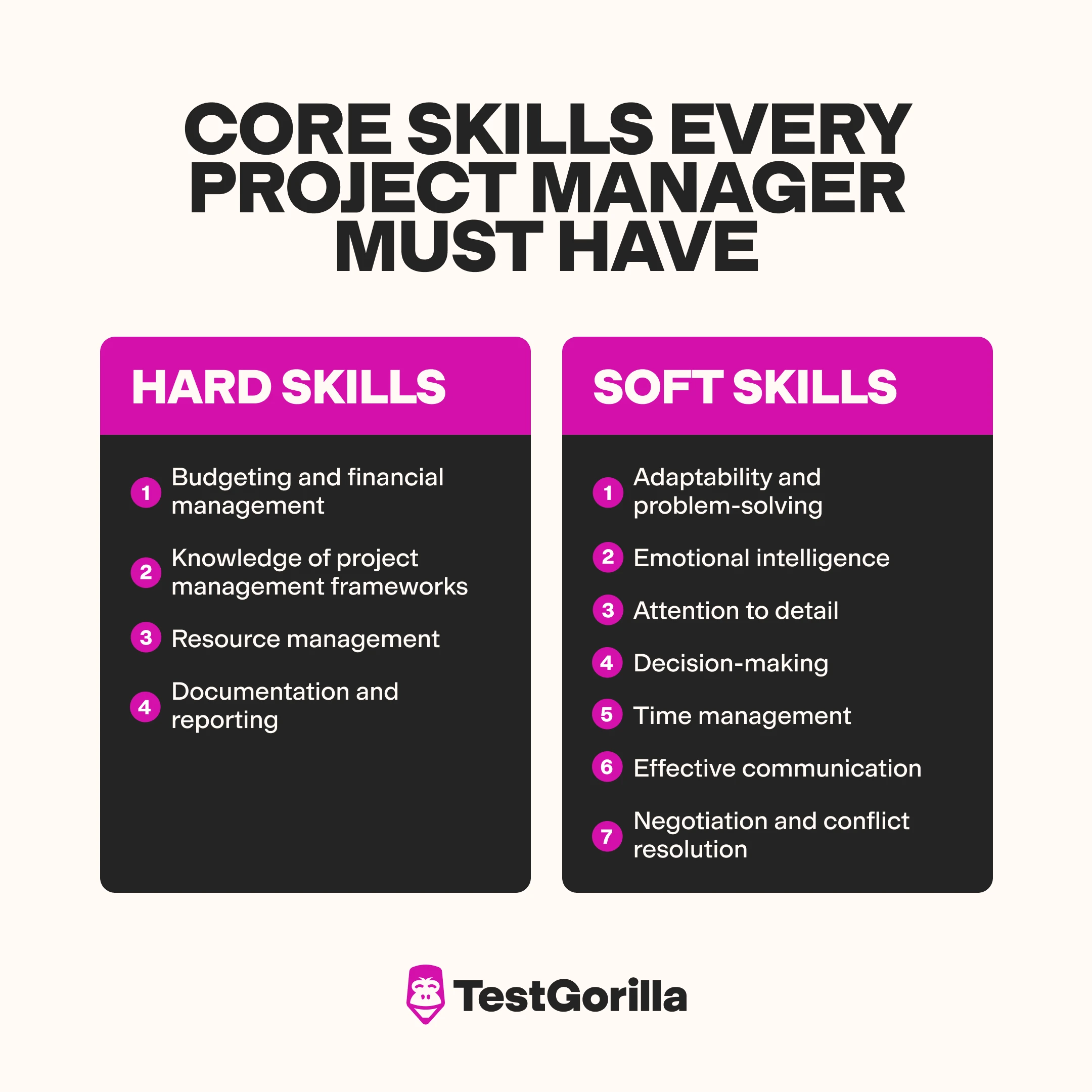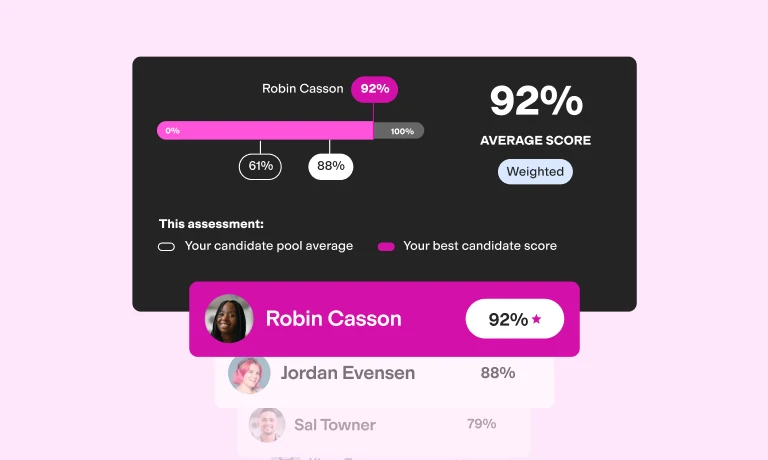Project managers really have their hands full. They have to deal with tight resources and surprise problems, keep everyone in the loop, and make sure projects stay on track. It's clear they need a special set of skills – and some smart planning – to handle all this.
But figuring out exactly what this special set of skills is can be tricky.
No worries – we can help. In this article, we'll dissect the core skills every project manager should have – and show you how to assess project management skills. This way, you can land the perfect project manager for your role. Let's get started.
What is a project manager?
Project management is all about designing, planning, and managing a project from start to finish.
So, what exactly does a project manager do all day? Here’s a look at their main tasks:
Creating project plans. Project managers put together detailed plans that set out the goals, schedule, resources, and key steps. These plans help the team know what’s expected and guide them toward the finish line.
Resource allocation. They figure out where to assign people and materials – and how to split the budget across different tasks based on what’s most urgent or important.
Stakeholder management. Project managers keep in touch with everyone who has a stake in the project – like clients, sponsors, and other managers. They listen to their needs, tackle their concerns, keep them in the loop with regular updates, and answer any questions along the way.
Documentation and reporting. They also keep detailed records throughout the project. This isn’t just for keeping track of progress and giving clients progress updates – it’s important for audits, too.
Core skills every project manager must have
A Fellow at the Association of Project Management, G. Reiss, once wrote, “Project management is like juggling three balls – time, cost and quality.”
Let's take a look at the key skills every project manager needs to have to perform this juggling act.
Hard skills
Budgeting and financial management. Project managers need to be sharp with numbers. They create accurate budgets, keep an eye on spending, and make sure money and resources are used wisely to keep projects on track and within budget.
Knowledge of project management frameworks. They should know their way around different project management methods like Agile, Waterfall, and Scrum. This helps them pick the best approach for each project and tweak their plans as things change.
Resource management. Project managers handle everything from their team to equipment and supplies. They need to use these resources wisely – without wasting time or money – to get the best results.
Documentation and reporting. Keeping detailed records and updating everyone on progress is a big part of their job. It keeps things transparent and helps with audits – enabling them to show that project activities comply with established standards and regulations.
Soft skills
Adaptability and problem-solving. Things don't always go according to plan. Project managers have to think on their feet, come up with solutions quickly, and adjust to new challenges to keep things moving smoothly.
Emotional intelligence. Understanding and managing emotions is key. It helps project managers work well with others, build trust, keep the team motivated, and resolve any issues in a positive way.
Attention to detail. They need to catch even the smallest mistakes to ensure everything is done right and meets all standards. This means checking and double-checking everything carefully.
Decision-making. When it’s crunch time, project managers have to weigh their options quickly, understand the risks, and make smart choices.
Time management. They’re pros at breaking down big projects into manageable tasks, figuring out how long each task will take, and setting realistic deadlines to make sure everything is completed on time.
Effective communication. Project managers need to keep everyone updated, manage expectations, and smooth over any rough patches with clear, direct talk, and good listening skills.
Negotiation and conflict resolution. They often find themselves in the middle of disagreements or needing to strike deals. Being good at finding solutions that work for everyone is a must.
The best insights on HR and recruitment, delivered to your inbox.
Biweekly updates. No spam. Unsubscribe any time.
How to assess project management candidates
Sometimes, telling the difference between a truly talented project management candidate and one who just sells themselves well is tough. After you write a project manager job description, talent assessments can help you find the ideal fit.
TestGorilla is a talent assessment platform that’s putting an end to paper-thin hiring processes. We show you what candidates’ resumes can’t show you: which skills your candidates actually possess.
There are 350+ tests in our test library, and you can create your own custom assessments using up to five of these tests. With these assessments, it’s easy to get a good understanding of every candidate.
Even better, TestGorilla helps hirings managers to compare candidates against each other. You can see who scored the highest and make better hiring decisions.
Start with the hard skills
Try using the following tests to assess your candidates’ technical skills.
Financial Management test. This test helps you measure whether candidates can forecast finances and make data-driven decisions.
Budgeting test. This test shows whether candidates know how to stick to financial rules, keep an eye on budgets, figure out funding needs, and more.
Project Management test. This test checks if a candidate can plan out a project schedule, handle daily project tasks, and keep everyone updated at every step of the project.
Communication Skills test. This test sees how well candidates can listen and understand conversations and non-verbal language.
Move on to soft skills
You can use these tests to measure a candidate’s soft skills:
Problem Solving Skills test. This test checks if candidates can analyze information to come up with conclusions, sort tasks by importance based on certain rules, and more.
Attention to Detail test. This test determines whether candidates can spot inconsistencies or differences – helping you see how detail-oriented they are.
Negotiation Skills test. This test sees whether candidates can take charge of a conversation and how well they can sway others. Results can clue you into how well they can resolve conflicts.
Take hiring to the next level with culture add assessments
TestGorilla’s Culture Add test helps you figure out how well a worker's values and actions match what your business needs. It shows whether they’ll be a good addition to your team’s culture.
Don’t underestimate the power of a culture add test. It’ll take your hiring to the next level.
How behavioral interviews can give you further insights
Asking questions about your project manager candidates’ past behaviors can reveal even more about how they think and act. You might ask something like:
“Can you describe a time you had to lift your team's spirits to achieve a goal? What led to the low morale, what steps did you take, and what was the result?”
Or you could ask:
“Tell me about a project that didn’t go as planned. What went wrong, how did you handle it, and what ended up happening?”
These questions help you understand how a candidate handles tough times, keeps themselves motivated, and pushes through challenges to complete difficult projects.
Need more inspiration? Check out this article of 69 project manager interview questions and kickstart your behavioral interview.
3 common mistakes when assessing candidates
Steer clear of these common pitfalls when hiring for a project manager role.
1. Taking a candidate at face value
A candidate with sharp presentation skills is also likely to be a bit of a showman. They’ll really sell themselves at interview, dazzling you with their answers and making a great first impression. But sometimes, these great first impressions don’t reflect their actual abilities on the job, and they might not overcome real-world challenges as expected.
This is why you must look beyond the surface and assess candidates based on their project management skills.
2. Forgetting about conflict resolution
Managing a project is a lot like being in the middle of a tug-of-war, where everyone has their ideas and priorities. A project manager’s job isn’t just about keeping everyone busy – it's about getting through disagreements without letting those disagreements knock the project off course. Whether they're dealing with clashing personalities or competing project visions, a project manager needs to be a pro at finding common ground quickly and effectively.
If you don’t check that a project manager candidate can handle these tough situations, you might end up with stalled projects, frustrated teams, and a whole lot of wasted time and resources.
3. Ignoring continuous learning
Project management is always evolving, so it's key for folks in this field to stay sharp and up to date. When you're picking a project manager, you need to make sure they're not just going through the motions but are actively improving their skills. This means checking if they've been hitting up workshops, networking at industry events, or snagging new certifications like PMP (Project Management Professional) or PRINCE2.
These signs of commitment to continuous learning are key – they show that the candidate is ready to handle new challenges and won't let your projects get stuck in the past.
FAQs
What qualifications does a project manager need?
Project managers often benefit from having certifications like PRINCE2 or PMP (Project Management Professional), but these aren't always a must. The key thing is that they have the right skills to manage projects effectively.
What are the job responsibilities of a project manager?
Project managers take care of planning and running projects. They work with stakeholders, manage the budget, solve problems, and keep track of everything that happens during the project.
Find the best project managers with TestGorilla
Project managers are key to getting your project across the finish line successfully. They handle everything from drafting up detailed plans to interacting with all the different people working on the project. It’s a role that demands a lot of flexibility and a broad skill set.
Knowing what skills to look for is crucial when you're ready to hire – and assessing these skills? That’s even more important.
Consider using TestGorilla to help you assess your candidate’s skills, abilities, and more. Ready to kick start your hiring campaign? Sign up for a free account or watch a live demo.
You've scrolled this far
Why not try TestGorilla for free, and see what happens when you put skills first.



















